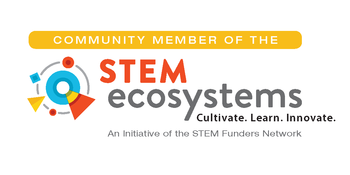
UNC Pembroke is partnering with the new STEM SENC which has been selected to join the STEM Learning Ecosystems Community of Practice, SLECOP, an initiative to improve education in science, technology, engineering and math.
STEM SENC (Southeastern North Carolina) will now connect with 67 other Ecosystems. Students must have quality, applicable STEM education to enable them to thrive in today’s world. STEM SENC’s work is grounded in an understanding that jobs in STEM careers are growing rapidly and that the national average wage for STEM-related occupations is nearly double that of non-STEM careers.
STEM Learning Ecosystems build strong collaborations in schools and beyond—in afterschool and summer programs, at home, with local business and industry partners, and in science centers, libraries and other places. Ecosystems strive to enable students to connect what they learn at home, in school and out-of-school with real-world opportunities.
STEM SENC is one of 12 Ecosystems being added to the global initiative. Benefits to joining the SLECOP include:
- STEM SENC will be provided with professional support to build and strengthen lasting, impactful collaboration among local organizations. This work requires a big picture perspective that is sometimes hard for individual partners to see. The SLECOP will help guide productive cooperation among local leaders in education, business, afterschool programs and more – all focused on best possible outcomes for students.
- STEM SENC will be able to learn from the collective experiences of other STEM Learning Ecosystem communities that are thriving across continents through an international community of practice network.
“We’re pleased to welcome STEM SENC to our community of practice. The Ecosystem was selected to join the STEM Learning Ecosystems Community of Practice because its local partners have already demonstrated a deep commitment for STEM learning across multiple platforms,” said SLECOP co-founder Gerald Solomon, executive director of the Samueli Foundation.
Ron Ottinger, co-founder of the SLECOP and executive director of STEM Next Opportunity Fund added, “We were impressed with STEM SENC’s commitment to serving those from under-represented populations.”
Jan Morrison, president and CEO of TIES, which provides support to the SLECOP communities, said the four-year-old initiative is credited with changing how millions of students learn and dramatically altering how educators teach STEM. “Our team is eager to develop partnership and learning objectives that are relevant for the local area.”
“It makes sense to collaborate with like-minded organizations, but that doesn’t mean it’s easy,” said Dr. Sue Kezios, coordinator of STEM SENC. “STEM Ecosystems provide design thinking and infrastructure support so that we can tailor quality STEM learning opportunities to our specific needs in southeastern North Carolina while leveraging the experiences of similar alliances across the world.”
Partners of the STEM SENC include: UNC Wilmington, Wendy Murphy (UNC System Board of Governors), UNC Pembroke, James Sprunt Community College, GE Hitachi Nuclear Energy, Corning, International Paper, the Brunswick County STEM Council, the North Carolina Museum of Natural Sciences at Whiteville, ROCAME, the North Carolina Science Festival, Centro Hispano, the Boys and Girls Club of the Lumbee Tribe of North Carolina, MarineQuest, the Child Development Center, Inc., Clinton City Schools, Columbus County Schools, Hoke County Schools, New Hanover County Schools, Onslow County Schools, Pender County Schools, Robeson County Schools, Burroughs Wellcome Fund, Raven Rock State Park, the NC Science, Mathematics, and Technology Education Center, the NC Southeast Regional Economic Development Partnership, and the Family Support Network of Southeastern NC.
Early plans for Southeastern North Carolina are to conduct an inventory of the STEM initiatives currently taking place throughout the region and to cultivate additional STEM partners for the ecosystem.
The following ecosystem communities were selected to become part of the STEM Learning Ecosystems Community of Practice:
- California: East Bay STEM Network
- Georgia: Atlanta STEAM Learning Ecosystem
- Hawaii: Hawai’iloa ecosySTEM Cabinet
- Illinois: South Suburban STEAM Network
- Kentucky: Southeastern Kentucky STEM Ecosystem
- Massachusetts: MetroWest STEM Education Network
- New York: Greater Southern Tier STEM Learning Network
- North Carolina: STEM SENC (Southeastern North Carolina)
- North Dakota: North Dakota STEM Ecosystem
- Texas: SA/Bexar STEM/STEAM Ecosystem
- Kenya: Kenya National STEM Learning Ecosystem
- México: Alianza Para Promover la Educación en STEM (APP STEM)
Learn more about the initiative at stemecosystems.org. Address questions to info@stemecosystems.org.